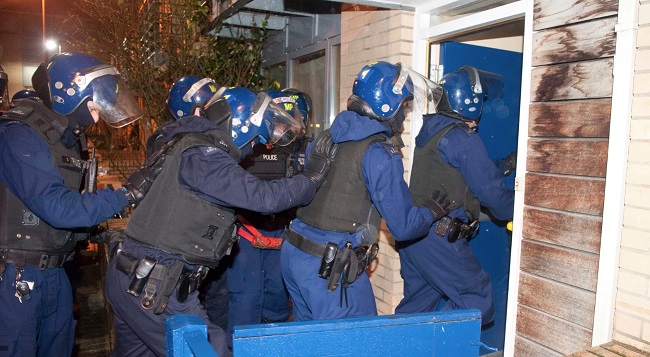The Law Commission has called for the public to be given greater protections from search warrants and said the complexity of current regulations has led to frequent errors and the risk of challenges.
 Photograph: (Metropolitan Police/PA)
Photograph: (Metropolitan Police/PA)
The commission said the current system for granting warrants is too complicated and there is a risk applications are not prepared properly or given sufficient scrutiny. It added that investigations may be significantly hindered as search warrants do not reflect a modern world in which the internet and digital sources play a significant role.
A search warrant is a written order authorising a police officer to enter a building to search and seize material of a kind specified in the warrant.
The most common type is issued under section eight of the Police and Criminal Evidence Act 1984, also known as PACE. The justice, or judge, must be satisfied there is reason to believe that an indictable offence has been committed and that relevant evidence can be found on the premises.
However, with more than 175 different issuing statutory powers available to investigators when applying for a warrant, it can be difficult to know which one is most appropriate since they often overlap.
Drafting errors may also occur which can make the warrant itself and any search unlawful.
The current system, the commission said, left the public unsure of the extent of the state’s power, what rights they have, and how to challenge a warrant.
In a well-received report, the independent body has recommended a streamlined system that would both clarify and rationalise the often-overlapping regulation.
The complicated current procedural nature means judges and magistrates can perceive issuing a search warrant as a rubber-stamping exercise to be swiftly dealt with before the “real” judging work of the day can begin.
In one case, an SFO probe was forced to end after the Tchenguiz brothers, a pair of property tycoons, successfully challenged the manner that the agency had obtained its search warrants.
It emerged that the issuing judge, in a 20-minute hearing, asked just one question – about the street name. The resulting case is understood to have cost taxpayers £7.5m.
There have been more than 50 reported judicial reviews relating to search warrants, or the conduct of a search.
“Search warrants serve an important purpose and are vital to successful criminal investigations,” said the Law Commissioner professor David Ormerod QC.
Advertisement
“But the law has to strike a balance between the powers of the state and the rights of individuals.
“Our proposals would simplify the law and modernise the powers needed by law enforcement to investigate serious crime.
“But, crucially, alongside that, they would extend protections so that people know that a search under a warrant is limited to what is necessary and proportionate.”
The review, which was commissioned by the Home Office in December 2016, was welcomed by both law enforcement figures and campaigners.
“I welcome this review as there can be no doubt that the current legislative landscape can, at times, create confusion and inconsistency in approaches,” said the director-general of the National Crime Agency, Lynne Owens.
“This becomes ever more complex as electronic evidence becomes a staple of almost every investigation.”
The review, which was commissioned by the Home Office in December 2016, was welcomed by both law enforcement figures and campaigners.
“I welcome this review as there can be no doubt that the current legislative landscape can, at times, create confusion and inconsistency in approaches,” said the director-general of the National Crime Agency, Lynne Owens.
“This becomes ever more complex as electronic evidence becomes a staple of almost every investigation.”
___________
___________